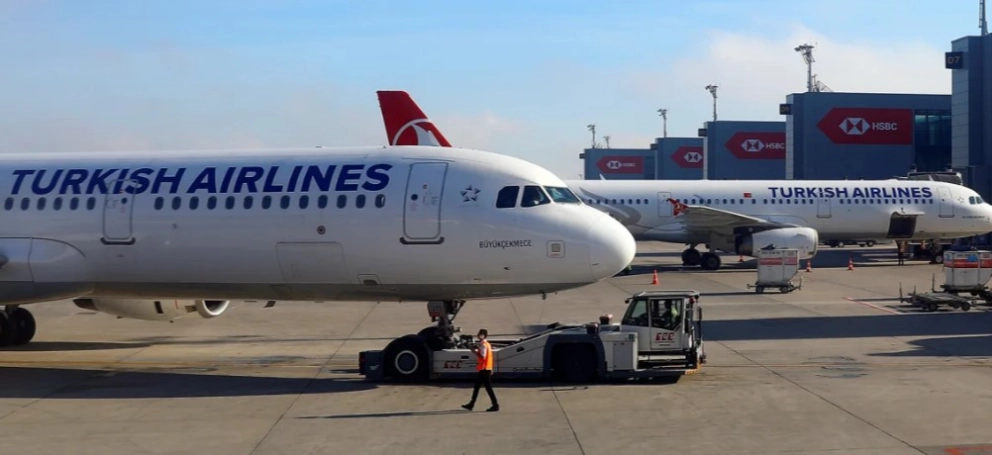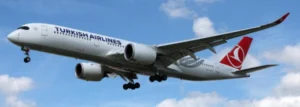Tragic Mid-Flight Emergency: Turkish Airlines Pilot’s Death Raises Aviation Safety C0ncerns
A Turkish Airlines flight faced a harrowing situation on October 8, 2024, when its pilot tragically passed away mid-flight, prompting an emergency landing at New York’s JFK Airport. This incident has raised significant concerns regarding aviation safety protocols and the emotional toll on crew members and passengers alike.
The Incident: A Flight into Crisis
 Flight TK6, operating from Istanbul to New York, was approximately 90 minutes into its journey when the captain experienced a medical emergency. According to reports, the pilot lost consciousness in the cockpit, leading to immediate panic among the crew and passengers.
Flight TK6, operating from Istanbul to New York, was approximately 90 minutes into its journey when the captain experienced a medical emergency. According to reports, the pilot lost consciousness in the cockpit, leading to immediate panic among the crew and passengers.
Emergency Response
The first officer quickly took control of the situation, declaring an emergency and requesting an immediate landing at JFK Airport. The plane, carrying 300 passengers and crew members, landed safely without further incident. Emergency medical personnel were on standby upon landing but were unable to revive the captain, who was pronounced dead shortly after.
Passenger Reactions
Passengers described the scene as chaotic yet commendable in terms of how the crew managed the crisis. Many expressed their shock and concern for the pilot’s health. One passenger recounted, “We were all scared; no one expected something like this to happen.” The quick actions of the first officer and cabin crew were praised for maintaining order during a highly stressful situation.
Investigating the Causes
Following the incident, Turkish Airlines announced that an investigation would be launched to determine the cause of the pilot’s death. Preliminary reports indicate that he may have suffered a heart attack, but further medical examinations will be necessary to confirm this.
Health Protocols in Aviation
This tragic event has sparked discussions about health protocols for pilots and crew members. While airlines conduct regular medical evaluations for their staff, questions arise regarding how often these assessments occur and whether they adequately account for sudden medical emergencies.
Aviation experts emphasize the importance of stringent health checks for pilots, particularly as many are approaching retirement age. The Federal Aviation Administration (FAA) mandates that pilots undergo regular medical examinations; however, there is ongoing debate about whether current standards are sufficient to catch potential health issues before they escalate.
Emotional Impact on Crew and Passengers
The psychological toll of such incidents cannot be overlooked. Crew members often receive limited training on how to handle emergencies involving their colleagues. This lack of preparedness can lead to emotional distress among cabin crew who may have worked closely with their fellow pilots. Passengers also face emotional repercussions after witnessing such traumatic events.
Airlines typically provide counselling services for both crew and passengers following serious incidents; however, immediate support may not always be available.
Support Systems in Place
Turkish Airlines has stated that it will offer psychological support services to both crew members and passengers affected by this incident. Such measures are crucial for helping individuals process their experiences and cope with any trauma they may have encountered during the flight.
Broader Implications for Aviation Safety
 This incident raises vital questions about aviation safety protocols and emergency preparedness across the industry. As air travel continues to grow in popularity, ensuring passenger safety remains a top priority for airlines worldwide.
This incident raises vital questions about aviation safety protocols and emergency preparedness across the industry. As air travel continues to grow in popularity, ensuring passenger safety remains a top priority for airlines worldwide.
Recommendations for Improvement
- Enhanced Health Screenings: Airlines should consider implementing more rigorous health screenings for pilots and crew members to identify potential health risks early.
- Emergency Training: Regular training sessions should be conducted for all flight crew on how to manage in-flight medical emergencies effectively.
- Mental Health Support: Immediate access to mental health resources should be available following any traumatic event involving crew or passengers.
Conclusion
The tragic death of a Turkish Airlines pilot mid-flight has highlighted critical issues surrounding aviation safety and emergency preparedness. As investigations continue into this incident, it serves as a reminder of the importance of robust health protocols and support systems within the airline industry.
By addressing these concerns head-on, airlines can work toward ensuring safer skies for all travellers.
